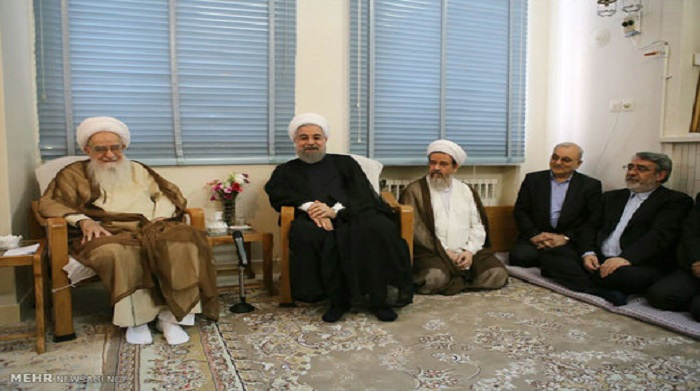Rouhani Strengthens Ties with Prominent Clerics

Scroll down the official website of the Iranian President and you will see more than a handful of twosome photos featuring Hassan Rouhani seated next to a prominent cleric in their humbly furnished beits, both parties posed in light-hearted talk, smiling. A repeated theme in the accompanying reports on each of the meetings, Rohani’s main agenda during his visit to the city of Qom, the religious capital of the country, is their saying prayers for the administration’s success. Grand Ayatollahs Javadi Amoli, Shobeiri Zanjani, Mousavi Ardebili, Sobhani, Alavi Gorgani, Vahid Khorasani, Makarem Shirazi, and Safi Golpayegani might represent quite opposing sociopolitical worldviews but have agreed to voice their support for the administration in what seems to be its toughest days since it took office. The finger-crossing gesture however comes alongside emphasis on the need to accelerate efforts to resolve the economic issues the ordinary people are wrestling with in their everyday lives.
A glance at the administration’s media arms gives the casual onlooker a banal collection of praise, prayers, moral advice and appreciation. On the other side of the coin came a trumpeting, by the principlist Nasim Online, that some of the remarks made by Ayatollah Makarem Shirazi had been censored. While the Persian version of President.ir has published a few of the Ayatollah’s guidelines concerning unemployment, production and development, the English version falls short. Here’s the only quote: “The government has carried out efforts to improve the conditions in the country”.
According to Nasim Online, the Grand Ayatollah has handed the President a tenfold list of recommendations. Closed down manufacturing units, inspection to avoid infringements, excessive imports, youth unemployment, partisan interests prioritized over national ones, taxes and VAT in particular, the targeted subsidy plan, resistance against the United States’ excessive demands, and cultural infiltration are the issues people had shared with the Grand Ayatollah, which he delegated to the President.
Seminary scholars of Qom are influential religious figures and their beits are in constant touch with various strata of society. Traditionally, administration officials work to elicit their endorsement. However, the relations between Qom and the Iranian administration were reduced to cold-shouldering during Ahmadinejad’s second presidential term. It was in 2011, mid-way through the term, when a member of Qom Seminary School’s high council revealed that many of the religious authorities did not accept the then president’s plea for visits and worse, the administration could not care less.
Rouhani and his cabinet members have tried to keep their relations with the prominent clerics in tip-top shape. Despite the sometimes-harsh criticisms from Qom on cultural issues and alleged westward policies, and a campaign against heavyweight Ayatollahs Mesbah, Yazdi and Jannati from the Assembly of Experts, the religious leaders of the country have often received the administration’s officials. There have been certain occasions where nuances got in the way. A latest instance came up after Mani Haghighi’s box-office hit Fifty Kilos of Sour Cherries, a slapstick comedy, became controversial for its allegedly obscene content. Culture Minister Ali Jannati, Ayatollah Jannati’s son, was reportedly declined a visit to Grand Ayatollah Makarem Shirazi. When he was finally received, a photo hit online featuring him kissing the Ayatollah’s hand in a gesture of respect and humbleness alongside remarks in which he said he was not properly informed about the content of the movie and would not have permitted its production if he had.
The administration is well aware of the fact that still a large part of the society view the clerical elites as their moral compass and oracles consulted on politics and more particularly so during elections. It will be outlandish for the Rouhani administration to think that Qom, the Shiite Vatican, will back them in next year’s election. However, it is paramount for them to shrink the increasing pressures from the principlists following a media fervor grown over what they call Rouhani’s impudence spewed in his remarks.The strategy to let sleeping dogs lie has worked so far.

